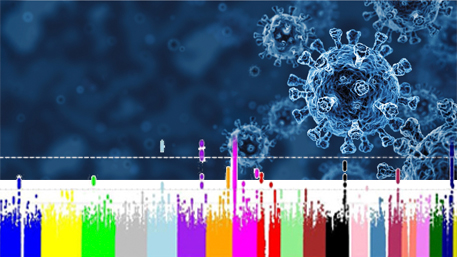The Contributions of Host Genomics Research to the COVID-19 Response: It’s Not Just About Genes!
Posted on by
A recent large collaborative host genomics study provides valuable insight into the interplay of biology and epidemiology on COVID-19. The study was based on a meta-analysis of nearly 50,000 patients from 46 studies spanning 19 countries. The study found 13 loci (specific locations on various chromosomes) associated with COVID-19 susceptibility or severity through genome wide association studies (GWAS), as well as causal evidence for the association for body mass index (BMI) and smoking with COVID-19 severity through Mendelian randomization.
Although host genomics studies in COVID-19 are still a work in progress, this type of research has the potential for both a direct public health benefit resulting from genetic knowledge itself and an indirect benefit resulting from the use of genetics to identify modifiable environmental factors. This study did both.
Genetics Can Inform Risk Prediction and Development of Therapeutics
Genetic associations provide the opportunity to understand the biology of COVID-19 and to predict outcomes. Specifically, for this study, 4 loci were found to be associated with COVID-19 susceptibility and 9 loci were associated with COVID-19 severity. In combination with important risk factors such as age and comorbidities, these 13 loci may provide additional information to further determine an individual’s risk for certain COVID-19 outcomes.
This study confirms the findings of previous studies by providing evidence for the role of blood type in COVID-19 susceptibility. This study also identifies immune system genes that may play a role in COVID-19 outcomes. For example, this study found a gene variant of TYK2, previously shown to protect against autoimmune-related diseases, to be associated with COVID-19 hospitalization and severity. Genetic associations could also provide valuable information through gene-environment interaction. Some disease outcomes may occur through an interaction between the human genotype and the environment, not solely because of human genotype or environmental exposures. A non-COVID-19 example of this includes the interaction between variants in the nitric oxide synthase (NOS) gene and pesticide exposure increasing risk for Parkinson’s disease. Other benefits genetic associations can provide are through understanding the COVID-19 biological mechanisms and the potential for developing drug targets.
Genetics Provides a Window on Modifiable Risk Factors
This study also provides insights into other benefits of host genomics research in COVID-19 through Mendelian randomization, a study design that uses human genetics as a proxy for modifiable exposures. Using human genotypes as proxies, this study explored 38 traits, including systolic blood pressure, 25-hydroxy vitamin D level, and total cholesterol. The results provided evidence for a causal association between higher BMI and smoking to COVID-19 severity. Mendelian randomization allows for a causal inference to be made about a modifiable exposure. This information may lead to better, more precise and effective preventive measures.
The study represents a landmark international collaboration for much-needed and timely host genomics research during a pandemic. Emerging human genomics research will continue to provide insights into host-pathogen interactions and enhance the effectiveness of the public health response to infectious disease threats.
Posted on by


